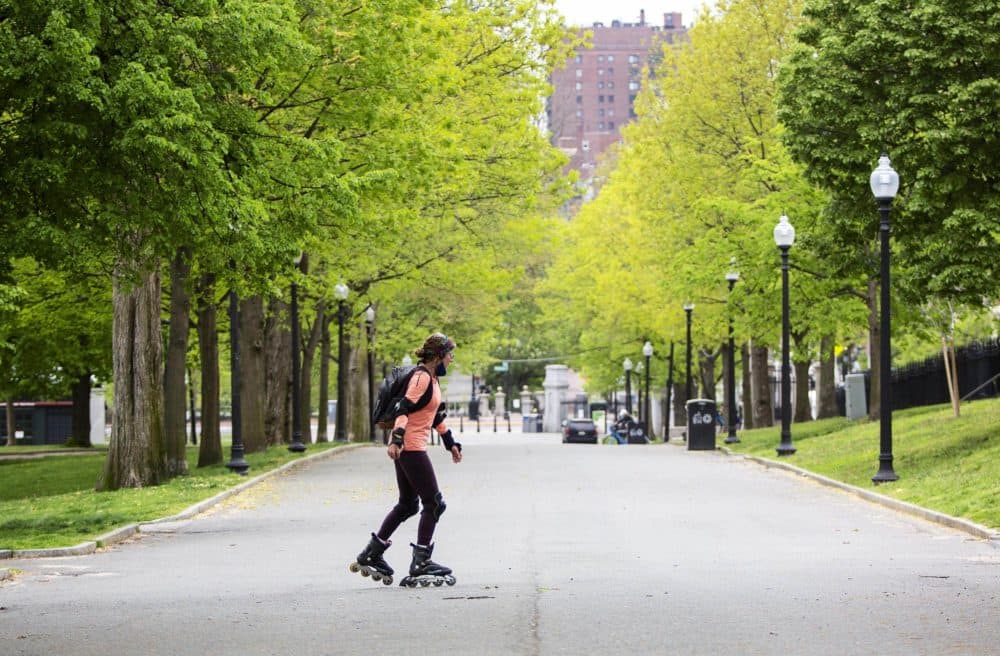Advertisement
Coronavirus Coverage
Health Experts Are Hopeful But Nervous About Mass. Reopening

Health experts reported mixed emotions as they listened to Gov. Charlie Baker announce his plan to gradually reopen the state’s economy. On the one hand, they said, it’s a good plan. But they expressed anxiety that easing stay-at-home restrictions and opening businesses might bring a new wave of coronavirus infections to an already hard-hit state.
“As a health care worker, I’m in this state of being torn between knowing that any reopening could very well be associated with an increased number of cases and then an increased number of deaths,” said Dr. Shira Doron, the hospital epidemiologist at Tufts Medical Center. “At the same time, as a human and a citizen of this state, I can see the toll these restrictions are having on mental and physical health, and the economy.”
Overall, Doron said she appreciates how much thought has gone into Baker’s plan, and she’s glad to see some things open back up.
Beaches, parks and outdoor recreation areas, for example, will see fewer restrictions, and Doron said these places provide a relatively low risk of transmitting infections, while also providing ample physical and mental health benefits.
“Athletic fields, fishing, hunting, gardens – the wide open space and better ventilation is going to keep the risk a lot lower,” she said. “Some of the other things worry me a bit more, though.”
Baker’s plan also allows offices to partially reopen and religious services to resume, although with restrictions on the number of participants. Opening these indoor spaces where a lot of people can interact — and potentially infect one another — worries Doron.
“Houses of worship can hold a lot of people, even with limited capacity,” she said.
Plus, as people begin moving about more in general, the possibility for a second surge of COVID-19 cases increases. After expending so much energy fighting the first wave of infections, a resurgence of the virus could exhaust an already battered health care work force, Doron said.
“We’ve simply been working all of our staff to their very max capacity for so long now that without time for rest and recovery, another surge could really take a major toll on health care personnel,” she said. “And we still have critical shortages of equipment, including personal protective equipment.”
Advertisement
Doron said there still isn't enough high-quality protective gear like masks and gowns even for normal operations, let alone a new run of coronavirus cases. Over the course of the pandemic, over 2,200 health care workers have tested positive for COVID-19, according to Donna Kelly-Williams, the president of the Massachusetts Nurses Association.
“One of the things we have to have in place to help prevent a resurgence is the personal protective equipment,” she said. “Having the highest standard of PPE helps prevent transmission of the virus from the patient to the caretaker.”
Health researchers said it’s difficult to predict exactly how the Baker administration's reopening plan will affect infection rates, but Jagpreet Chhatwal, a data scientist at Harvard Medical School, said there is a chance that second wave might never come. He’s been running models to simulate how the pandemic might respond to different scenarios.
If Bay State residents increase their movement by only about 20% for the next four months, Chhatwal’s model suggests, cases will continue to trend down.
“We can take that risk,” he said. “But we have to be very cautious. If we open too fast, we can see a spike coming back.”
Ultimately, the outcome of the reopening will depend on several factors that remain unknown, Chhatwal said, such as the success of an ambitious contact tracing program to track down people who may have been exposed to the coronavirus and quarantine them.
Another hard to predict element is people’s behavior. As restrictions ease and doors open, Chhatwal said, it’s unclear how much people will adhere to guidelines like wearing face masks and keeping at least six feet away from others. It’s also unclear whether people will feel safe enough to visit some of the establishments that are reopening. Barber shops will be allowed to open starting Monday, for example. Would Chhatwal get a haircut?
“I would not,” he said.
Chhatwal would advise state officials to keep a close eye on cases of the coronavirus. If infections begin returning en masse, then state officials will need to adjust the plan accordingly. But, he added, that’s easier said than done. Because symptoms take so long to show up, any change in the numbers is roughly two weeks behind the real situation.
“So, if you’re seeing cases today rising, that means there’s enough spread that has happened in the last two weeks,” Chhatwal said. “We lift restrictions. If cases are rising, we bring them back. Then lift again. It’s very likely that we will be seeing these waves off and on.”
That might go on, he said, until researchers complete a vaccine or enough people develop immunity to coronavirus to end the pandemic.
This segment aired on May 19, 2020.
